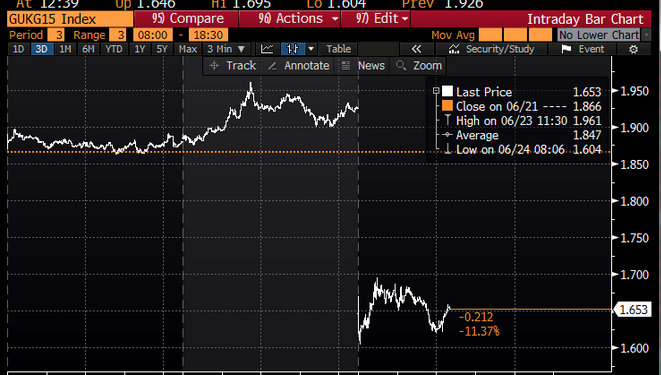UK DB scheme deficit jumped £80bn overnight as gilt yields collapsed in response to the Brexit vote, with deficits hitting record highs seen back in February this year.
Figures from Hymans Robertson show the hole in DB pension funding has increased from £820bn yesterday to £900bn today, with UK DB liabilities now at £2.2 trillion.
Fifteen year gilts fell from 1.925 per cent at yesterday’s market close, and opened this morning around the 1.650 mark, widening deficits on DB schemes.
Experts are predicting the fall in yields will filter through to annuity rates, causing even more pain for DC retirees.
Hymans head of corporate consulting Jon Hatchett says: “While we’d advise schemes to avoid over-reacting to short term market volatility, as the dust settles, it may be worth considering whether any changes to investment strategy are required. Particular care should be sought if any triggers have been breached and we recommend seeking clear advice before taking any action.
“While the short term economic effects will be predominantly negative, the pain will not be shouldered equally. Companies will be waking up to a new dawn today, and contingency plans will be kicking into place. Trustees will rightly want to understand what these plans look like, and reassess their scheme funding strategies accordingly.
“What events of recent weeks do highlight is the need for schemes to become more resilient to risk. Specifically, they need to ensure they don’t take more risk than they need to.
“The risks associated with holding too much in volatile risk based assets are more acute for schemes which are more mature. Without a clear disinvestment plan, schemes can find themselves forced to sell assets at inopportune times. This exacerbates underlying market volatility.
“Much of our pensions and insurance legislation and regulation has been produced by the European project – the recently implemented Solvency II is just one example. While it is hard to see any rollback of antidiscrimination legislation, depending on the future trade compact agreed with the remainder of the EU, the UK has more freedom to set its own policy. What this means is impossible to say at the moment, but we will all need to keep a watching brief in the months ahead.”

Hargreaves Lansdown head of retirement policy Tom McPhail says: “Final salary scheme sponsors and trustees should brace themselves for some unwelcome news on scheme valuations. If these numbers feed through into scheme liabilities it could exacerbate the deficits that already exist in many schemes.
“Investors planning to buy an annuity might want to get their skates on; if these numbers feed through into annuity rates I’d expect to see them fall.”





